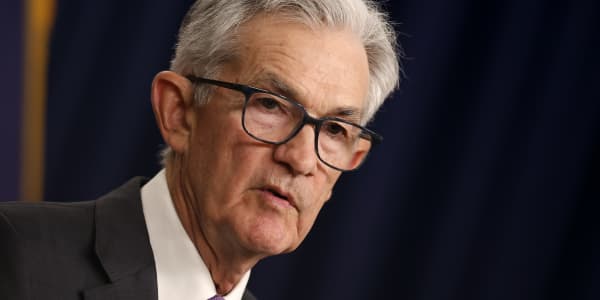This report is from today's CNBC Daily Open, our new, international markets newsletter. CNBC Daily Open brings investors up to speed on everything they need to know, no matter where they are. Like what you see? You can subscribe here.
What you need to know today
Clawing back losses
U.S. stocks rallied Monday after the S&P 500 fell into correction territory last week. The Dow Jones Industrial Index had its best day since June. Europe's Stoxx 600 index added 0.36%, but is still on track to drop 4.6% in October, according to LSEG data. Meanwhile, Germany's gross domestic product shrank 0.1% for the quarter, less than the 0.3% forecast.
Smoother roads ahead
The United Auto Workers' strike against General Motors, Ford Motor and Stellantis looks set to end soon. The union came to a deal with GM on Monday morning, sources told CNBC. Prior to that, the UAW reached a tentative agreement with Ford on Wednesday and Stellantis on Saturday. Under the agreements, the top wage for workers is boosted to more than $40 an hour.
But not for Tesla
Tesla shares sank nearly 5% after Panasonic said it was reducing production of electric batteries because of flagging demand for Tesla's vehicles. Earlier in the month, Tesla CEO Elon Musk cautioned shareholders high interest rates are forcing the company to keep prices low and hampering consumers' ability to spend. Shares of the EV maker have dropped more than 18% since Musk's warning.
AI under the 'force of law'
U.S. President Joe Biden announced a new executive order on artificial intelligence that aims to instate security guardrails around the booming technology. Key components of the order include: protecting consumer privacy, supporting workers, promoting competition and advancing equity. Like all executive orders, it "has the force of law," according to a senior administration official.
[PRO] A sell-off buying opportunity
The recent sell-off in stocks might spook investors. Consumers, too, might think that the economy's slowing down. But Goldman Sachs' chief equity strategist thinks such negative sentiment gives rise to a "buying opportunity," especially for a certain type of stock that boasts a healthy balance sheet.
The bottom line
After a rough week amid accelerating inflation and disappointing earnings, stocks bounced to start the week.
The Dow Jones Industrial Average broke its three-day losing streak and climbed 1.58% for its best day since June 2. The S&P 500 rose 1.2%, its best daily performance since Aug. 29, and also broke a three-day drop. The Nasdaq Composite gained 1.16% for its second positive session.
Technology stocks largely led the surge Monday. Amazon jumped 3.9%, Microsoft rose 2.27% and Meta increased 2%. In fact, Fundstrat's Tom Lee thinks this group of tech megacaps can push the S&P higher not just for the day, but until the end of the year. "I don't think FAANG fundamentals are weaker — they're still at the center of this AI, secular story," Lee told CNBC.
Other analysts also see a shift in the winds. "Investors are finally feeling a little bit more confident that perhaps we priced in enough bad news and that's really manifesting in a stronger market today," said Art Hogan, chief market strategist at B. Riley Financial.
The Federal Reserve meeting concludes Wednesday — the central bank is expected to keep interest rates unchanged — and might also give stocks a fresh tailwind. If the Fed does hold rates at the same level, Hogan thinks it "may signal that the cycle of raising rates is over," which might "stop that parabolic rise we've seen in Treasury yields," he said. Lower Treasury yields — or at least a pause in rising yields — eases borrowing costs, giving the economy and financial markets more room to breathe.
However, it might be too early to let your guard down. Ari Wald, head of technical analysis at Oppenheimer, wrote that the S&P's "correction since July hasn't run its course." Wald thinks the broad-based index will dip to 4,050 — around 100 points lower than its Monday close — before reversing losses.
But the S&P might not even correct itself, according to Morgan Stanley chief U.S. equity strategist Mike Wilson. On the contrary, Wilson — who's one of the most bearish strategists on Wall Street, according to CNBC's Market Strategist Survey — thinks the S&P will fall to 3,900 at the end of the year.
The spread in opinions may make the picture ahead murky, but, ironically, it does make one thing clear: markets are increasingly volatile. Investors would do well to guard against more wild swings.





